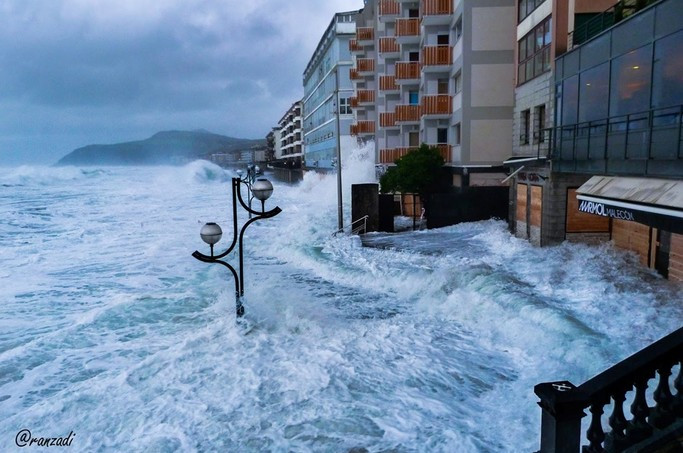City Resilience
Climate Change
Post-Doctoral Fellowships
Spain
Are cities properly preparing for climate change?
Photo: Zarautz, Basque Country (Spain), February 2014. Photo by Asier Aranzadi

Adapting adaptation investment to climate-related risks
With this in mind, Olazabal set out to fill the gap and confront existing data on specific climate-related risks – a database developed by BC3 colleagues on climatic risks which covers 120 coastal cities –, and new data on adaptation investments in cities. « In a nutshell, the specific objectives of this project include the creation of a database to track urban climate change adaptation initiatives, the development of assessment methods for the effectiveness of those initiatives to reduce vulnerability or increase resilience to climate change and, finally, the validation of the relevance and usability of the outputs », she summarizes. « We will be asking questions such as: Have cities started planning? How? Are they already in the phase of implementing adaptation measures? Are they considering big, less likely disasters as well? We’ll also define indicators, metrics, to see if they are doing it right, according to the risks they are exposed to. ». The last step will be to do a big case study on a particular country, compare the policies in different cities and engage with policy makers and stakeholders. « We haven’t selected the country yet, but we’ll choose one that is critically exposed and that is relevant in terms of how they have developed plans so far », Olazabal specifies.
Adaptation to climate change, especially in densely populated areas, will be one of tomorrow’s most pressing challenges, even if the Paris Agreement’s 2°C objective can be attained. Dr. Olazabal’s research will innovatively address this challenge by setting out to understand how well current urban adaptation initiatives are designed, in relation to the specific risks each coastal city may be exposed to. Her cutting-edge approach will provide a timely and highly-needed global analysis on whether coastal cities are on the right track to be effective in reducing vulnerability to sea-level rise, and in building adaptive capacity. Her results will contribute to reducing coastal risks derived from climate change by helping policy makers to align adaptation strategies with expected impacts, therefore increasing policy efficacy.
Discover Marta's video:
Articles on Dr. Marta Olazabal's project

Marta
OLAZABAL
Institution
BC3 Basque Centre for Climate Change - Klima Aldaketa Ikergai
Country
Spain
Nationality
Spanish
Related articles
Climate Change
Food & Nutrition
AXA Chair
Argentina
Harnessing the Potential of RNA: Pioneering a Sustainable Path to Climate-Resilient Crops
Federico Ariel's research project addresses this critical threat to global agricultural productivity and offers a potential solution. His focus on... Read more

Federico
ARIEL
National University of the Litoral (UNL)
Climate Change
Post-Doctoral Fellowship
Hungary
How Will Climate Change Affect Bird-Spread Diseases
Expected start date:Aug-2023 Human, animal, and environmental health are interconnected. Climate change may alter the transmissions of diseases that can... Read more

Tamara
SZENTIVANYI


.thumbnail.jpg)